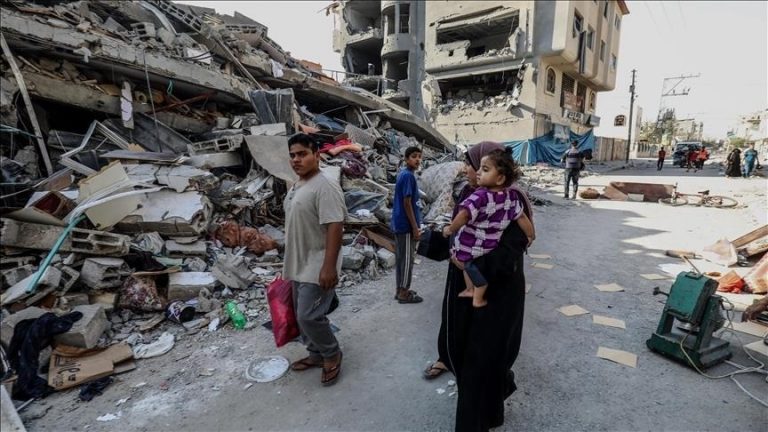Trump Declares Middle East War Over as Gaza Peace Deal Sparks Global Optimism — Oil Prices Expected to Drop


U.S. President Donald Trump on Monday declared that the war in the Middle East was “over,” as he arrived in Tel Aviv to oversee what he described as the “final phase” of a long-awaited Gaza peace deal.
The president’s visit marked a pivotal moment in the two-year conflict between Israel and Hamas — and a potential turning point for the region’s stability, global diplomacy, and oil markets.
Trump’s declaration came hours after the release of Israeli hostages held by Hamas since the 2023 assault that ignited the war. Speaking at the Knesset, Israel’s parliament, he announced that Hamas would disarm as part of the peace accord and confirmed that the fighting had officially ended. When asked by reporters if the war was truly over, Trump responded succinctly: “Yes.”
Register for Tekedia Mini-MBA edition 18 (Sep 15 – Dec 6, 2025): registration continues.
Tekedia AI in Business Masterclass opens registrations.
Join Tekedia Capital Syndicate and co-invest in great global startups.
Register for Tekedia AI Lab: From Technical Design to Deployment.
Greeted with trumpet fanfare and a standing ovation, the president told lawmakers that the “long and painful nightmare” was finally ending for both Israelis and Palestinians.
“America joins its ally in two everlasting vows,” he said. “Never forget, and never again.”
His remarks carried both triumph and restraint. Trump hailed the ceasefire as “a very exciting time for Israel and the Middle East,” adding that Israel had “won all it could by force of arms.” He urged the country to turn its military victories into peace and reconstruction.

“Now it is time to turn that strength into prosperity,” he said.
Trump extended a diplomatic olive branch to Iran, the chief backer of Hamas, calling for an end to hostility.
“The hand of friendship and cooperation is always open, even to Iran, whose regime has inflicted so much death on the Middle East,” he said. “I’m telling you, they want to make a deal. We are ready when you are.”

That overture underscores how deeply the Iran-Israel conflict has shaped both the Gaza war and global energy markets. Since the 2023 Hamas attack on Israel that killed 1,200 people and led to a devastating military response in Gaza, tensions between Israel and Iran have repeatedly threatened to spiral into a regional war. Those hostilities pushed oil prices to multiyear highs, with Brent crude briefly surpassing $110 per barrel in late 2023 amid fears that Iranian proxies could target shipping routes and oil infrastructure across the Gulf.
Analysts say that if Trump’s ceasefire and outreach to Iran hold, global energy markets could finally experience some relief. The Gaza war — coupled with Red Sea shipping disruptions caused by Yemen’s Houthi rebels — had driven up transport costs and added volatility to crude prices throughout 2024.
The Gaza war, one of the most destructive in modern Middle Eastern history, has left deep scars. More than 67,000 Palestinians have been killed, according to Gaza’s Health Ministry, while most of the enclave’s infrastructure — from schools to hospitals — lies in ruins. Israel’s two-year military campaign displaced millions, leaving the territory facing one of the worst humanitarian crises in decades.
“You’ve won, and now you can build,” Trump told Israeli lawmakers. “You can do something you never even thought possible.”
He emphasized that the “total focus of Gazans must be on restoring stability, safety, dignity, and economic development,” pledging that the United States would support Gaza’s rebuilding efforts.
The president’s address came as 20 Israeli hostages were released, along with 28 additional captives — including 26 confirmed dead — in exchange for nearly 2,000 Palestinian prisoners and detainees. The deal was hailed as a humanitarian breakthrough and a significant step toward ending the cycle of violence.
Trump’s peace effort has drawn cautious praise from economists and foreign policy experts who see the development as both a humanitarian and geopolitical milestone.
“It shows that the U.S. can get results if it wields its still unsurpassed global clout the right way,” said Holger Schmieding, chief economist at Berenberg Bank. “The impact on the global economy and markets should remain limited for now, but if tensions in the Middle East subside much further, the global impact could be more pronounced — especially through lower oil prices and reduced shipping disruptions.”
The Israeli-Iran standoff has long been one of the biggest geopolitical risks in the oil market. Iranian-backed Houthi attacks on Red Sea vessels forced shipping companies to reroute tankers around the Cape of Good Hope, adding weeks to delivery times and driving freight costs sharply higher. If the peace deal leads to a sustained truce and reduces these threats, analysts say oil could retreat below $60 per barrel — down from the $80 average that persisted through much of 2024.
The peace deal marks a personal and political milestone for Trump, who has repeatedly portrayed himself as a master dealmaker capable of solving global conflicts. It builds on his earlier Middle East diplomacy, including the Abraham Accords, and could become a defining achievement of his presidency. Trump praised Israeli Prime Minister Benjamin Netanyahu, U.S. Secretary of State Marco Rubio, and senior aides such as Jared Kushner, Steve Witkoff, and Pete Hegseth for their roles in brokering the accord.
Following his meetings in Tel Aviv, Trump is expected to travel to Sharm El-Sheikh, Egypt, for a summit with about 20 world leaders to finalize the Gaza peace framework. The conference will focus on reconstruction funding, Gaza’s future governance, and regional security guarantees. Gulf nations, including Saudi Arabia, Egypt, and the UAE, are expected to play major roles in financing Gaza’s rebuilding.
However, Gaza’s humanitarian crisis is far from over, and skepticism runs deep about whether Hamas’s disarmament can be verified or whether Iran will curb its proxy networks in Lebanon, Syria, and Yemen. Yet, for the first time in two years, the prospect of lasting calm seems within reach.





